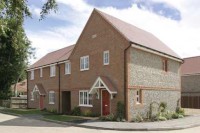If you have a mortgage, your lender will insist that you take out buildings insurance. If you are a tenant, your landlord should normally arrange a policy. In other cases, buildings insurance is not compulsory, but you would be unwise to do without it.
The amount of cover you need is the cost of rebuilding your home, which should include the cost of demolition (if needed), clearing the site, and architects' and builders' fees. This is not the same as the market price of your home.
Buildings insurance generally covers damage due to fire, lightning, explosion or earthquake, theft (or attempted theft), riots or vandalism, storms or flooding, subsidence, falling trees, moving objects (such as a cars hitting your home) and escaping or leaking water or oil (from a tank or pipe, say).
Damage to your property because of subsidence is usually covered, too, although there is often a larger excess (the first amount of any claim that you have to meet) for this type of claim - normally £1,000 or more.
You may find it hard to get cover if you live in an area repeatedly affected by flooding
Buildings policies usually cover subsidence damage only to the house itself. Patios, garden walls, driveways and swimming pools arenít usually covered, unless your house is damaged at the same time. Storm damage to gates, fences and boundary walls is normally not covered, either.
You may find it hard to get cover if you live in an area repeatedly affected by flooding.
Accidental damage cover on a buildings policy protects against damage you cause to your building or fixtures and fittings. Standard policies include only limited cover, for example for accidental damage to glass in doors, windows and skylights, and damage to bathroom fittings such as baths and sinks.
Buildings insurance usually also covers:
Your legal liability as owner of the property, such as liability for damage caused to someone else's property
Damage to underground cables that supply gas or electricity, or pipes that supply oil, water, or sewage.
You can pay extra to extend accidental damage cover to a wider range of problems. Typically this costs between £20 and £100 a year extra.
You can choose the level of cover you need in one of two ways. With a sum-insured policy, you work out how much cover you need, and the insurer calculates your premium on that basis.
A bedroom-rated policy does away with the need to calculate exact costs, and instead is based on the number of bedrooms your home has (subject to maximum amounts of cover).
It's not always obvious which type offers the best value, so we suggest you get quotes for each before deciding.
Our online home insurance quotation engine is simple to use and provides clear details of the policies available. This allows you to see both the price and policy details for over 60 house insurance policies available in the UK. You'll be able to see the cheapest deals on offer and pick one which best suits your needs.







